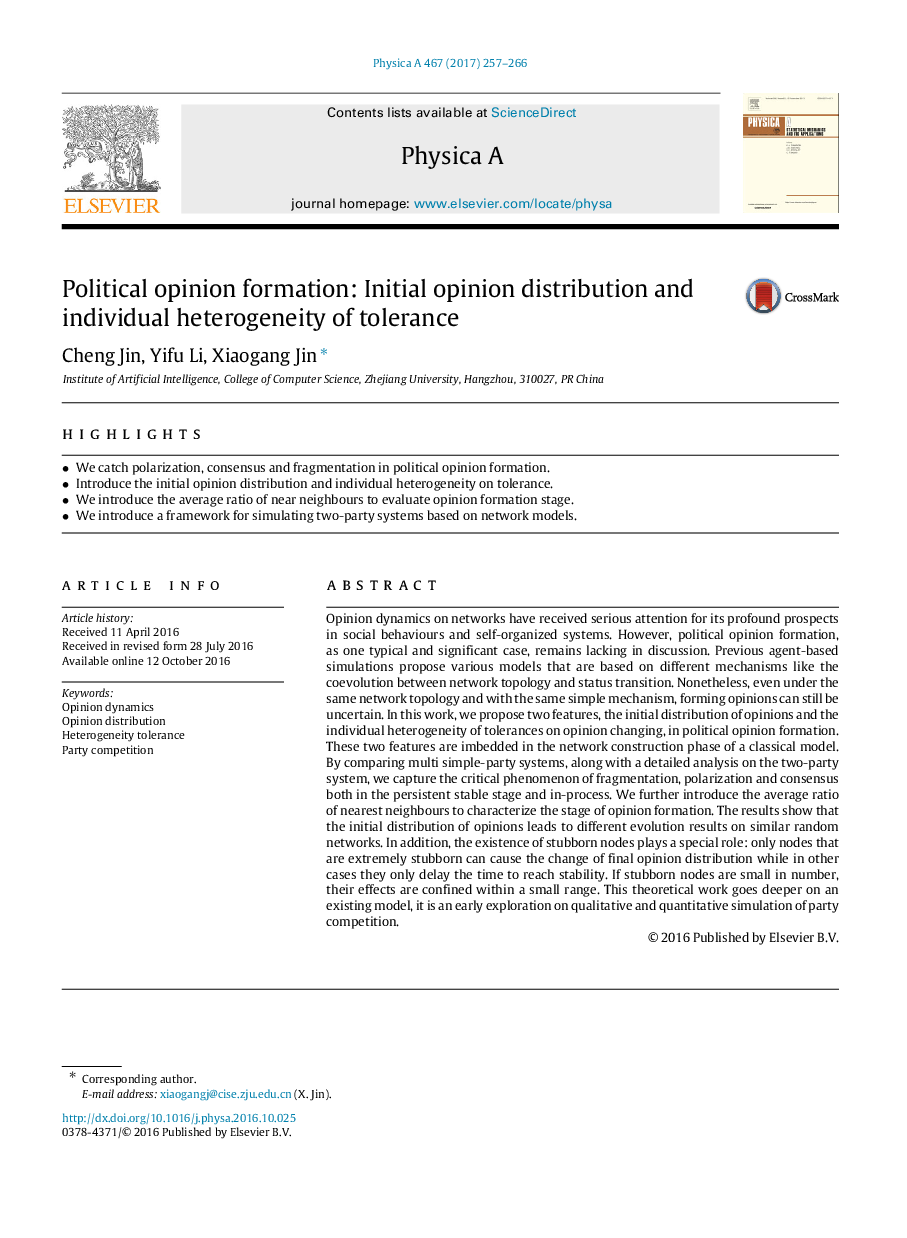| کد مقاله | کد نشریه | سال انتشار | مقاله انگلیسی | نسخه تمام متن |
|---|---|---|---|---|
| 5103418 | 1480106 | 2017 | 10 صفحه PDF | دانلود رایگان |
عنوان انگلیسی مقاله ISI
Political opinion formation: Initial opinion distribution and individual heterogeneity of tolerance
ترجمه فارسی عنوان
شکل گیری افکار سیاسی: توزیع نظر افکار اولیه و ناهمگونی فردی تحمل
دانلود مقاله + سفارش ترجمه
دانلود مقاله ISI انگلیسی
رایگان برای ایرانیان
کلمات کلیدی
نظر پویایی، توزیع نظرات، تحمل ناهمگنی، رقابت حزب،
ترجمه چکیده
دینامیک نظری در شبکه ها توجه جدی به چشم انداز های عمیق خود در رفتارهای اجتماعی و سیستم های سازمان یافته ای دریافت کرده است. با این حال، شکل گیری عقیده سیاسی، به عنوان یک مورد معمول و قابل توجه، همچنان در بحث کم است. شبیه سازی های مبتنی بر عامل های قبلی، مدل های مختلفی را پیشنهاد می دهند که بر اساس مکانیزم های مختلفی نظیر هماهنگی بین توپولوژی شبکه و انتقال وضعیت است. با این وجود، حتی با همان توپولوژی شبکه و با همان مکانیسم ساده، اظهار نظر ها هنوز هم نامعلوم است. در این کار، ما در دو ویژگی، توزیع اولیه نظرات و ناهمگونی فردی از تحریم ها در مورد تغییر دیدگاه، در شکل گیری افکار سیاسی پیشنهاد می کنیم. این دو ویژگی در مرحله ساخت شبکه از یک مدل کلاسیک تعبیه شده اند. با مقایسه سیستم چند حزبی ساده و تجزیه و تحلیل دقیق در سیستم دو طرفه، ما پدیده بحرانی قطعه قطعه شدن، قطبش و توافق هم در مرحله پایدار و هم در فرایند را می گیریم. ما بیشتر نسبت به نزدیکترین همسایگان را برای مشخص کردن مرحله تشکیل افکار معرفی می کنیم. نتایج نشان می دهد که توزیع اولیه نظرات منجر به نتایج مختلف تکامل در شبکه های تصادفی مشابه می شود. علاوه بر این، وجود گره های خیره کننده نقش ویژه ای ایفا می کند: تنها گره هایی که بسیار خسته کننده هستند، می توانند تغییر توزیع نگرشی نهایی را جلب کنند، در حالی که در موارد دیگر، تنها زمان برای رسیدن به ثبات را به تاخیر می اندازند. اگر گره های خفیف کوچک باشند، اثرات آنها در محدوده کوچک محدود می شود. این کار نظری عمیق تر بر روی یک مدل موجود ادامه می یابد، این یک اکتشاف اولیه در مورد شبیه سازی کیفی و کمی از رقابت های حزبی است.
موضوعات مرتبط
مهندسی و علوم پایه
ریاضیات
فیزیک ریاضی
چکیده انگلیسی
Opinion dynamics on networks have received serious attention for its profound prospects in social behaviours and self-organized systems. However, political opinion formation, as one typical and significant case, remains lacking in discussion. Previous agent-based simulations propose various models that are based on different mechanisms like the coevolution between network topology and status transition. Nonetheless, even under the same network topology and with the same simple mechanism, forming opinions can still be uncertain. In this work, we propose two features, the initial distribution of opinions and the individual heterogeneity of tolerances on opinion changing, in political opinion formation. These two features are imbedded in the network construction phase of a classical model. By comparing multi simple-party systems, along with a detailed analysis on the two-party system, we capture the critical phenomenon of fragmentation, polarization and consensus both in the persistent stable stage and in-process. We further introduce the average ratio of nearest neighbours to characterize the stage of opinion formation. The results show that the initial distribution of opinions leads to different evolution results on similar random networks. In addition, the existence of stubborn nodes plays a special role: only nodes that are extremely stubborn can cause the change of final opinion distribution while in other cases they only delay the time to reach stability. If stubborn nodes are small in number, their effects are confined within a small range. This theoretical work goes deeper on an existing model, it is an early exploration on qualitative and quantitative simulation of party competition.
ناشر
Database: Elsevier - ScienceDirect (ساینس دایرکت)
Journal: Physica A: Statistical Mechanics and its Applications - Volume 467, 1 February 2017, Pages 257-266
Journal: Physica A: Statistical Mechanics and its Applications - Volume 467, 1 February 2017, Pages 257-266
نویسندگان
Cheng Jin, Yifu Li, Xiaogang Jin,
